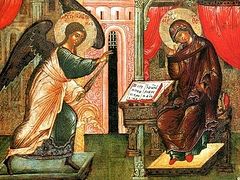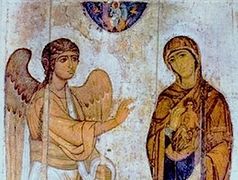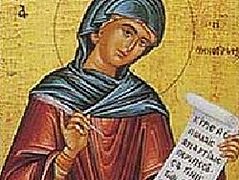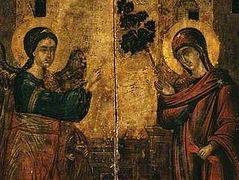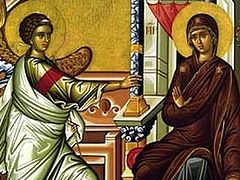The Reading from the Holy Gospel according to St. Luke. (1:24-38)
 Fragment of an icon of the Annunciation. Byzantium. 12th C. Mt. Sinai, Egypt, St. Catherine's Monastery.
Fragment of an icon of the Annunciation. Byzantium. 12th C. Mt. Sinai, Egypt, St. Catherine's Monastery. The Virgin Mary said “yes” to the will of God. And our ancestors Adam and Eve said “no” to the command of God. This act of rebellion against God and His one commandment did not hurt God. It did not add or take away from God Himself. He has no need of us or of our obedience to Him. This “No” did not take anything from God but it took everything away from us.
What was taken away from us by the act of “No”, could only be returned to us by a powerful act of “Yes.” The most important of these is the “yes” of the Virgin Mary to the Angel Gabriel’s message to her. We might say to ourselves, what is the big deal? She was being honored by God, what is so difficult about that? But the truth is that her “yes” was also a burden. What was the burden? She would be pregnant without a husband. She had just been betrothed to the elderly Joseph, who had taken her under his wing as a father figure and now she would accept to become pregnant. In the days of the Virgin Mary, it was often the case that a woman who was found pregnant out of wedlock, might be stoned and killed as this was considered a great offense since the time of the law of Moses. Her “yes” to God might have meant her life. Later on her “yes” meant that she was displaced from her home and hunted along with her beloved Son. It meant that she would live for years as a refugee and alien in the strange land of Egypt. Sometimes saying “yes” means suffering greatly for the name of Christ.
The thousands of martyrs of our holy Church remind us that often our “yes” to God is a kind of a death sentence. When our heroic men and women and children were asked if they would worship idols they said “no” and when they were asked to deny their faith in Christ they said “no” and when they were asked to affirm their beliefs, they said “yes” to belief in Jesus Christ. They took this all the way through the sufferings and tortures and to death. In fact it is this faith that confirms that Christianity alone is true because the holy disciples suffered and were murdered for their belief, for their “yes” in the risen Lord Jesus. They would only choose to say “yes” and to suffer if it was all true or if they strongly believed it to be true.
We have come to a time in this country where we better be ready to say “yes” and no” when it matters. We have come to a time when we need to be prepared to give an answer when it is increasingly inconvenient to do so and when we are increasingly risking our way of life, our jobs and our reputations to do it. There are many examples of this. We should say “no” to the idolization of sexuality and all the ways that has been twisted in our culture. We should say “no” to sacrificing everything, including our families for success and wealth and “freedom”. We should say “no” to endless distractions from a life of prayer. We should say “no” to endless excuses that keep us from church. We should say “no” when a co-worker or a classmate uses the name of Jesus Christ in vain. We should say “no” when we are told to compromise our values or morals to do our work.
We should say “yes” to everyone who asks us if we believe in God. We should say “yes” to loving everyone around us, no matter their political or ideological slant. We should say “yes” Jesus Christ is the only way to truly know God, and we should live as if we really believe it. We should say “yes” and acknowledge God daily no matter what it might cost us. The Virgin Mary’s “yes” was done selflessly and with great risk to herself and even to her child. But this “yes” made it possible for Jesus Christ to become a man and to say yes to His Father and go to the cross for us. This selfless “yes” which led to His death, became our only hope of life. His “yes” became a universal “yes” for all of humanity.
One woman said “no” to God and “yes” to herself. The other reversed the course of nature by reversing the response of humanity. She said “yes” to God and “no” to herself. The secret that becomes evident in her life and in the life of everyone who says yes to God is that when we say yes to Him and allow Him to do His will in our lives, we are not saying “no” to ourselves at all. In fact we are finally living up to the purpose for which we were created. We become exalted by God to a very high state and this is more true with the Virgin Mother than with any other who has ever lived a merely human life. And we see this of all places in the book of Revelation where St. John the beloved disciples writes these words “And there appeared a great wonder in heaven; a woman clothed with the sun, and the moon under her feet, and upon her head a crown of twelve stars: And she being with child cried, travailing in birth, and pained to be delivered. And there appeared another wonder in heaven; and behold a great red dragon, having seven heads and ten horns, and seven crowns upon his heads. And his tail drew the third part of the stars of heaven, and did cast them to the earth: and the dragon stood before the woman which was ready to be delivered, for to devour her child as soon as it was born. And she brought forth a man child, who was to rule all nations with a rod of iron: and her child was caught up unto God, and to his throne” (Rev 12).
God exalted her because she humbled herself and was obedient, she said “yes” to Him. What about each of us? How will we answer this high calling that is put before us? May we each give a good answer to the glory of God, AMEN.

